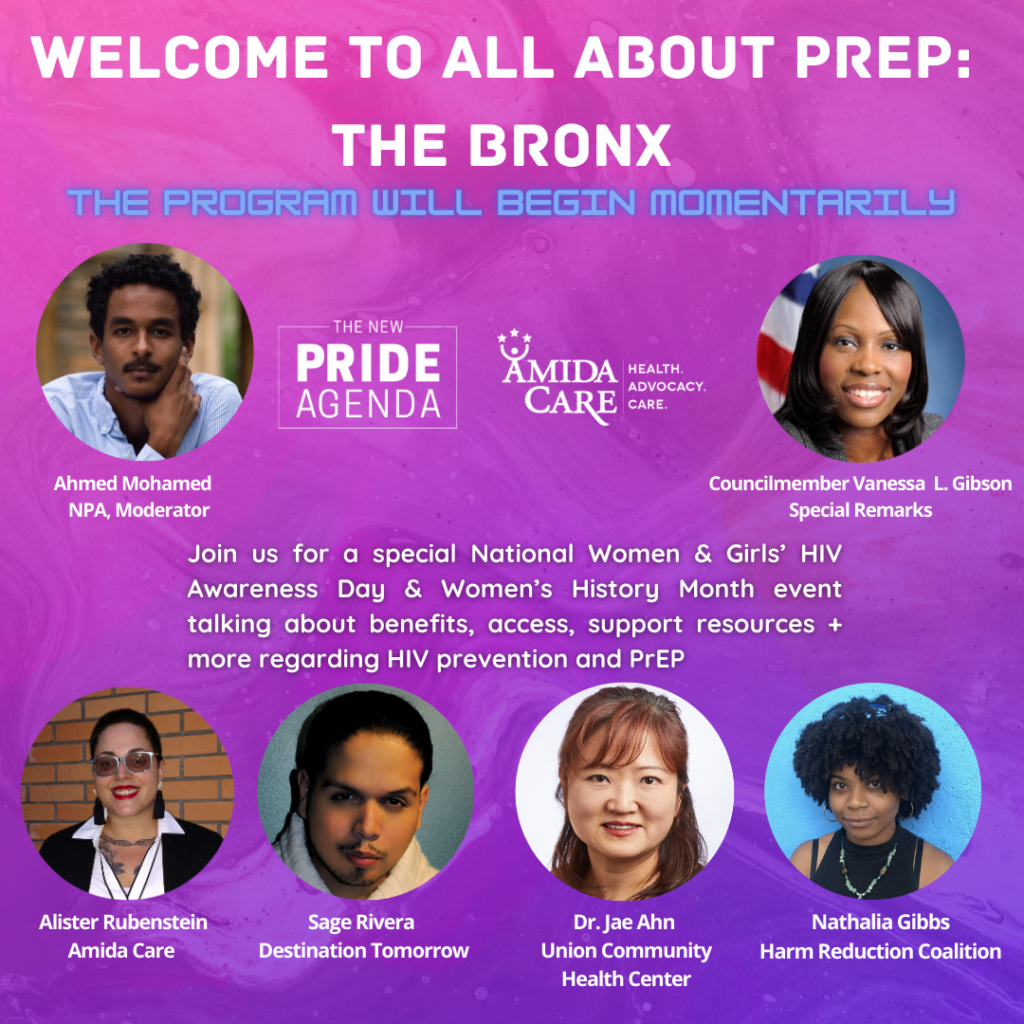Amida Care and NEW Pride Agenda Host “All About PrEP” Town Hall, With a Focus on HIV Prevention in the Bronx and Among Women
March 30 2021
Online discussion featured New York City Council Member Vanessa L. Gibson, Ahmed Mohamed of NEW Pride Agenda, Dr. Jae Ahn of Union Community Health Center, Nathalia Gibbs of Harm Reduction Coalition, Sage Rivera of Destination Tomorrow, and Alister Rubenstein of Amida Care
To view a recording of the Town Hall, click here
On Thursday, March 25, Amida Care, New York’s largest nonprofit Medicaid Special Needs Health Plan (SNP) designed for New Yorkers affected by HIV, co-hosted a town hall event with NEW Pride Agenda, a nonprofit LGBTQ advocacy organization that works to promote LGBTQ rights in New York State, to discuss HIV prevention and pre-exposure prophylaxis (PrEP). The event was the latest in a series of “All About PrEP” virtual town halls co-sponsored by the two organizations to increase awareness about the importance of PrEP, which is proven to reduce the risk of getting HIV from sex by 99%; address common challenges in accessing PrEP; and dispel myths and misconceptions about PrEP.
 The panel discussion, with experts from HIV and LGBTQ service organizations, focused on the Bronx, which has been historically underserved in efforts to end the HIV epidemic. In honor of Women’s History Month and National Women and Girls HIV/AIDS Awareness Day, the town hall also emphasized the importance of HIV education outreach among women, who are often overlooked in these efforts.
The panel discussion, with experts from HIV and LGBTQ service organizations, focused on the Bronx, which has been historically underserved in efforts to end the HIV epidemic. In honor of Women’s History Month and National Women and Girls HIV/AIDS Awareness Day, the town hall also emphasized the importance of HIV education outreach among women, who are often overlooked in these efforts.
“Unfortunately, the Bronx continues to have some of the highest rates of HIV diagnosis in the city…this is in part a result of unequal access to HIV prevention and care services in many low income zip codes, like the ones I represent,” said Vanessa L. Gibson, New York City Council Member representing the Bronx’s 16th Council District, who gave introductory remarks. “And not enough attention is given to how HIV/AIDS impacts our women, specifically women of color. One in five new HIV diagnoses are among women, and nine in ten of these are African American and Latina women. These are our sisters, mothers, aunties, cousins, grandmothers, and friends whose stories are not being told.”
Throughout the discussion, panelists emphasized finding creative ways to reach these underserved populations. “We have made strides in the right direction, but there is definitely still work to be done,” said Ahmed Mohamed, Civic Engagement and Community Organizer at NEW Pride Agenda, and moderator of the discussion. “There must be other entry points when engaging folks about HIV prevention and PrEP, aside from explicitly talking with a doctor.”
“There is an increase in people being aware of what PrEP is and what it does,” said Sage Rivera, Director of Programs at Destination Tomorrow. “But as far as PrEP uptake, there are some disconnects, and they have to do with socioeconomic factors in accessing PrEP, including housing, and not having enough [culturally competent]and conscious places to go to for physical and mental health care.”
Panelists pointed to the necessity of education and training for health care providers to better serve these communities. “When discussing sexual health, many might not be heard in the ways they’re expressing themselves, the ways they’re describing their experiences, the ways they’re describing their relationships to sex,” said Nathalia Gibbs, LGBTQ and Harm Reduction Coordinator at The Harm Reduction Coalition. “These challenges aren’t necessarily inherent to women, but rather the spaces that they’re going to seek care—a lot of the work rests on us.”
“We need to do better at creating comprehensive, affirming care spaces—and also at increasing data collection,” said Alister Rubenstein, Transgender Health Program Manager at Amida Care. “People doing this work have a responsibility to collect, congregate, and share data so we can all work together to make better programs that work for trans people in particular.”
Another common theme among the speakers is the urgency of these efforts. “Time is of the essence,” said Dr. Jae Ahn, Chief Medical Officer at Union Community Health Center. “We have to break down the barriers on both sides, through education and by not being fearful of talking about sex.”
